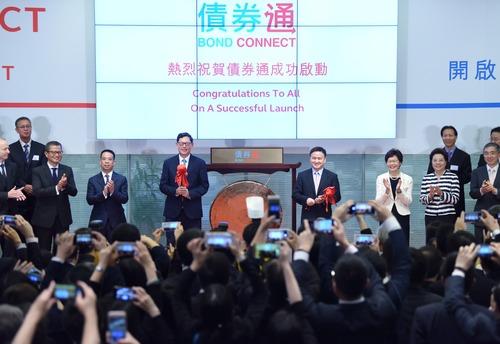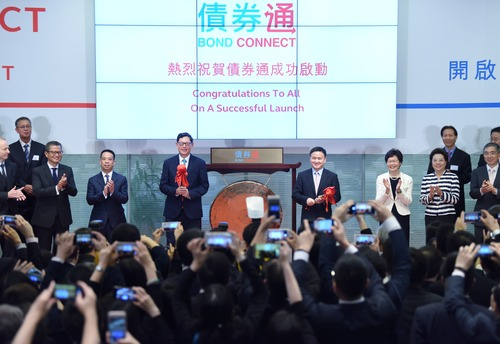
Participants attend a ceremony held by Hong Kong Exchanges and Clearing Limited to launch the "northbound" mainland-Hong Kong bond connect in Hong Kong, south China, July 3, 2017. (Xinhua/Wang Shen)
BEIJING, June 30 (Xinhua) -- Shanghai Stock Exchange (SSE) released on Tuesday detailed rules to facilitate overseas institutional investors to invest in the SSE bond market, reported Xinhua Finance.
SSE formulated the rules, effective as of June 30, 2022 to facilitate overseas investment into SSE's bond market.
Overseas institutional investors that have been given nod to enter the interbank bond market are allowed to invest directly or via the Bond Connect scheme in China's exchange bond market.
Overseas institutional investors here refer to foreign central banks or monetary authorities, international financial organizations, sovereign wealth funds, financial institutions incorporated overseas such as commercial banks, insurers, securities firms, fund management firms, futures firms, trust firms and other asset management institutions, and mid- and long-term institutional investors including pension funds, charity funds, and endowment funds.
SSE said overseas institutions were permitted to participate in primary market subscription, trading or transfer of bonds including corporate bonds and convertibles, asset-backed securities, bond lending, related derivatives for the purpose of risk management and bond funds including bond ETFs.
Recent years, overseas institutions have significantly raised their bond holdings and became important participants in China's bond market.
Statistics with the Shanghai Head Office of the People's Bank of China showed that by the end of May, overseas institutions held in total 3.66 trillion yuan of bonds on China's interbank bond market, taking up around 3.0 percent of the comparable total.
Prior to the channels expansion, overseas institutions could enter China's interbank bond market via the Bond Connect and China Interbank Bond Market (CIBM) Direct while only qualified foreign institutional investors (QFIIs) and Renminbi QFII (RQFIIs) could invest in the exchange bond market, said analysts with Golden Credit Rating International Co., Ltd.
Alongside the ongoing opening-up, direct overseas investment into China's bourse bond market is helpful to enrich investor types, diversify fund sources, and improve the liquidity and stability of exchange bond market, said the analysts. (Edited by Duan Jing with Xinhua Silk Road, duanjing@xinhua.org)




 A single purchase
A single purchase









